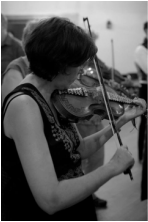|
Welcome to my blog. This is my first post! I am a fiddler and I love traditional music. In fact I love all music. But its through traditional music that I have found my way into music full time at Stevenson College in Edinburgh! What a change in my life! More on that later.
First genre I will be blogging about is the blues. Aah - the blues. I flicked though my (vinyl) record collection the other day - yes I am afraid I am that old - and they were all there. Eric Clapton - first album I ever got was Best of Cream - Ten Years After with the fantastic rock blues singer and guitarist Alvin Lee. Bob Dylan, the Rolling Stones, the Beatles, Moody Blues, the list goes on. You see, there are advantages to being my age! Would any of these iconic bands and musicians exist if it weren’t for the blues? Would I even be a musician if it weren’t for the blues? I honestly doubt it. My love of music comes from these early influences in my life although I have now found my way into the trad world, I haven’t dusted off these albums for possibly decades. But thinking about the blues has encouraged me to look again at this treasure trove. So what have I learned so far? A lot! First some blues history. Who started it all and how did the blues develop? Most people probably know that the blues is attributed to the music of the Negros who were transported form West Africa and enslaved. I lived in West Africa for a time when I was young. My overriding memory of West African music is drumming, rhythm and singing - but not particularly in a blues style. The music has diverged and developed through the generations and other influences. Nevertheless, the slaves brought their music with them - at least in terms of tonality. What other influences have payed a part? The blues style we think of today is also linked to the gut wrenching depression and desperation those enslaved faced in relation to the hard labour and abuse they were forced to endure with no hope of escape. “ The blues is a low down aching chill. If you ain’t ever had ‘em I hope you never will” Robert Johnston Slaves were often killed or worked to death. They endured terrible hardship and unbelievably cruel punishment. The early blues music responds to the work and their plight. It helped slaves keep their spirits up and get through the day. It kept up a rhythm of the swing of the picks, or whatever labour they were undertaking. The blues were also infused with some western traditional music too. The Scots, Irish and other nationalities had emigrated in large numbers and influenced the various blues styles that emerged. Father of the Blues William Christopher (WC) Handy (16/11/1873 - 28/3/1939) is known as the Father of the Blues. Apparently he, in turn, heard the blues from a farm worker who was playing in an obsessive blues style. So it goes further back. However, WC Handy was probably the first to bring the blues to the attention of a wider audience. His father was a Minister and he was probably luckier than most. He learned to play the coronet in a barbers shop in Memphis. He travelled extensively trying to make a living out of being a musician. He had his own band and began writing songs - including the Memphis Blues. He faced much prejudice in trying to publish his music but eventually succeeded in publishing himself. And so news spread. Memphis Blues apparently inspired the Foxtrot which became hugely popular in the many dance halls up and down the country. He also wrote the “St Louis Blues” one of the most recorded songs in the history of music. He wrote many spirituals and eventually published a book “WC Handy’s collection of Negro Spirituals.” Styles Black people began to migrate to other areas of USA to find work, especially following the war of independence and the depression. The music went with them and began to spread and develop into distinct styles. Following WC Handy’s success, others were encouraged to follow. Mamie Smith made the first recording “Crazy Blues” in 1920. Bessie Smith, Ma Rainey recorded vocals and Louis Armstrong, first a jazz player, accompanied them and absorbed the blues style. Street musicians emerged and and started to record inspiring a whole new generation of blues guitar players. There were many styles. The earliest blues vocals were rooted in work songs of the south. Call and response songs were the bedrock where the gang leader would sing a line and the other workers would respond. During the 1930s the early Mississippi delta performers Charley Patton, Robert Johnston and Son House travelled throughout the southern states spreading their tales of woe through the music. On the east cost a more folky style developed with musicians such as Blind Boy Fuller, Sonny Terry and Rev Gary Davis. In Kansas city Count Basie was absorbing the blues and developing a big band jazz style, while in New York Billie Holiday was emerging as a star. In the 1940s urban blues grew and spread, Los Angeles musicians were pioneering Jump blues. This still used call and response but with the singers (shouters) calling and saxophones (honkers) responding. In Chicago electric blues began to emerge and by 1950s was in full swing with BB King, Muddy Waters, John Lee Hooker, T- Bone Walker and Howling Wolf - great names!! There were also the Louisana blues, Texas blues, Boogie Woogie, Rhythm and blues. Some bluesmen visited England (e.g. Bill Broonzy) which spread and developed the blues on this country. In 1960s UK guitarists such as Eric Clapton, Peter Green, Jimi Hendrix emerged with powerful amps and solid body guitars - this enabled the blues to develop a harder, driving rock sound. The Rolling Stones were named after a Muddy Waters song. These Brits with their own style of electric blues had amazing success. But this in turn promoted the traditional blues artists in the USA. Muddy Waters apparently said of the Rolling Stones “They stole my music but they gave me my name” The UK musicians inspired development of new and exciting styles e.g. heavy metal, blues rock, hard rock etc. From the 1970s onwards fewer dedicated blues musicians have emerged. However the blues continued to develop with musicians such as Stevie Ray Vaughn, Robert Cray and Gary Moore. Tragically Stevie Ray Vaughn died in a helicopter crash in 1990 after playing at an Eric Clapton concert in Milwaukee. But thanks to people like Stevie Ray Vaughn, modern electric blues emerged in the 1990s. Who will be the next great blues player of the younger generation? Who knows. But ask yourself if most of the music you listen to would be here without the blues? Probably not? We shouldn’t forget that so many suffered to bring us this rich musical heritage.
0 Comments
Your comment will be posted after it is approved.
Leave a Reply. |
Fiona Harrison
|


 RSS Feed
RSS Feed
